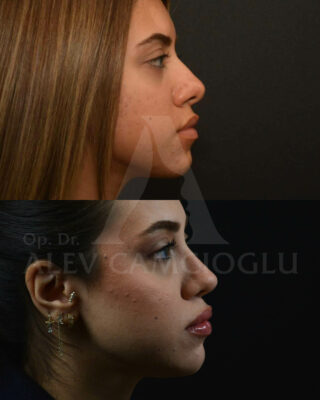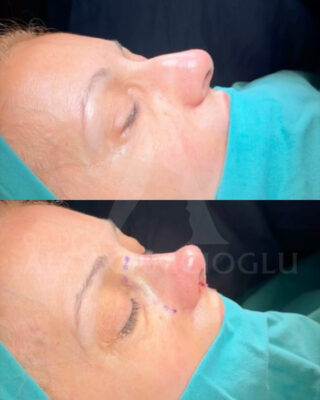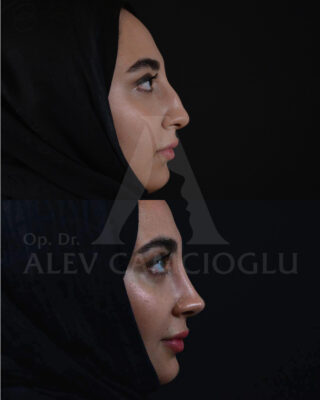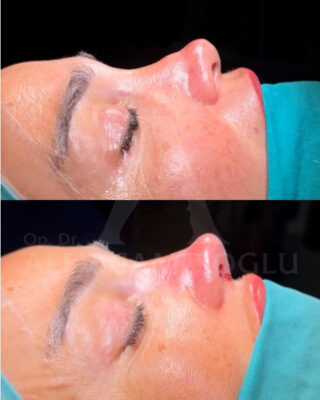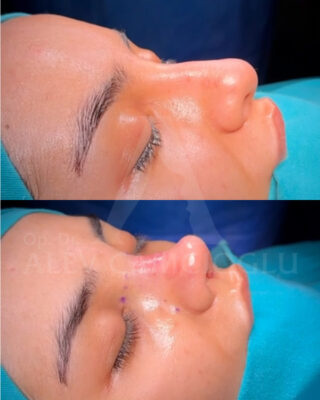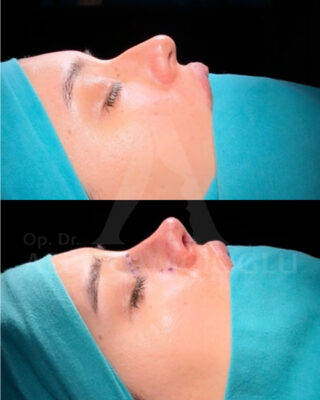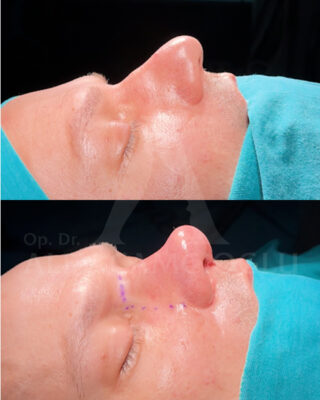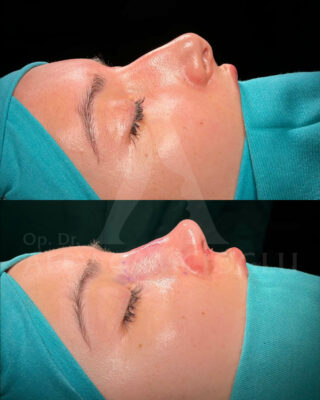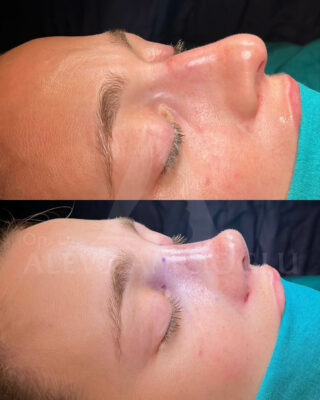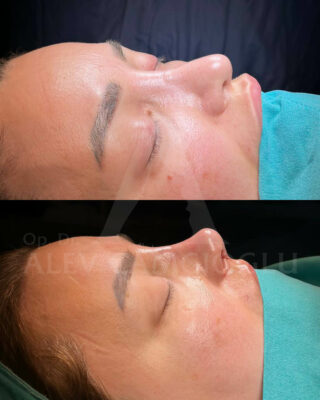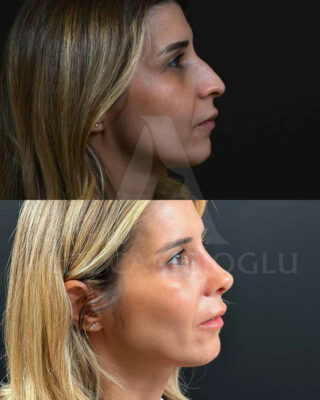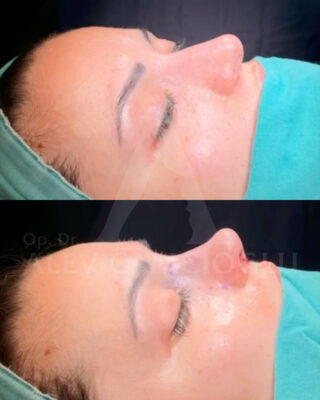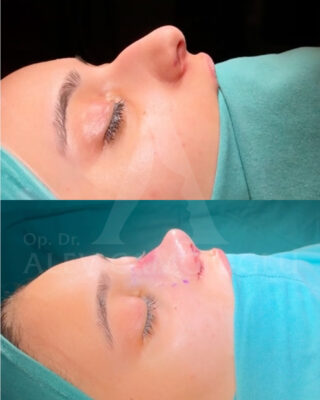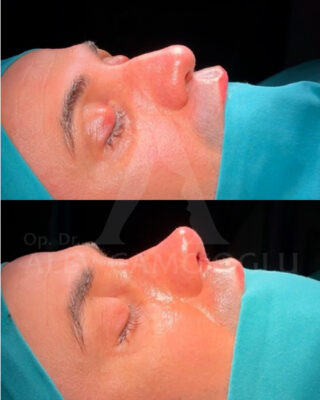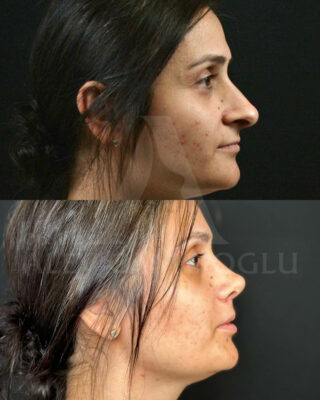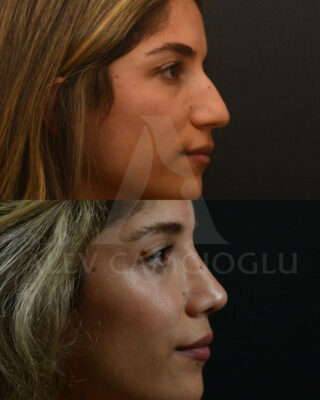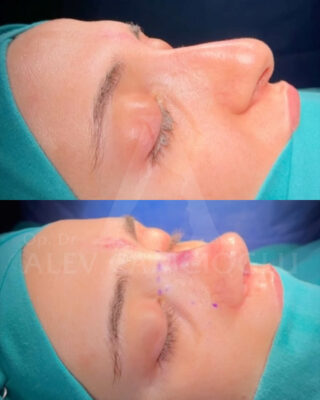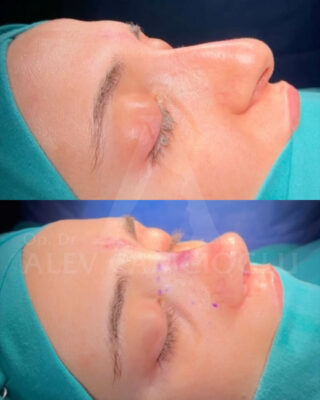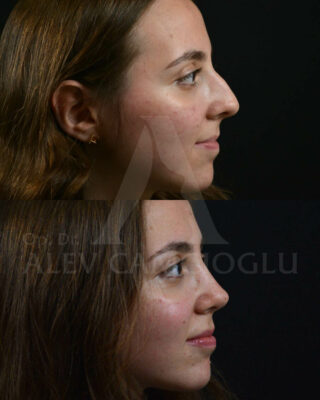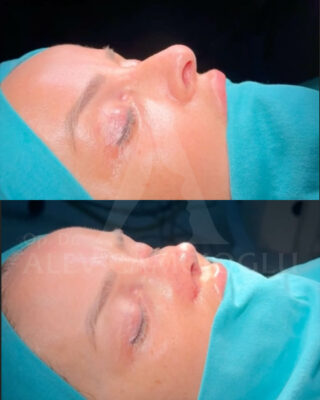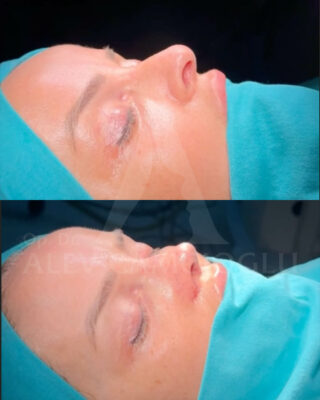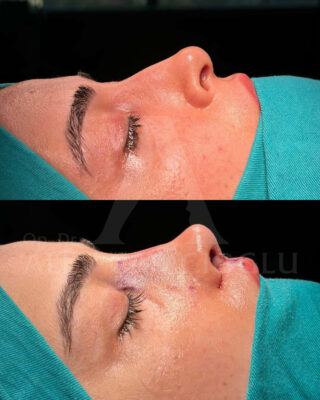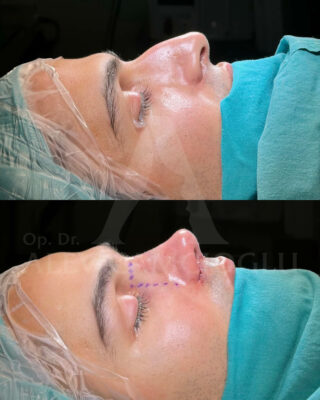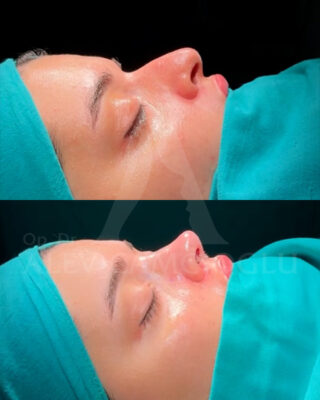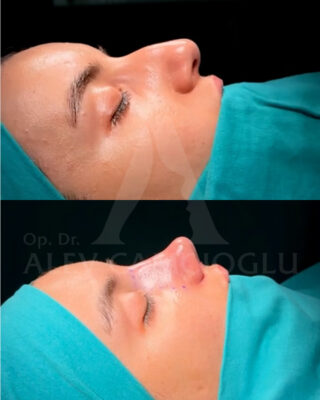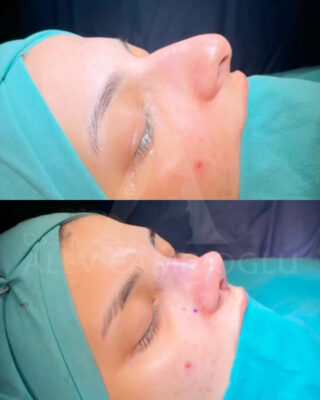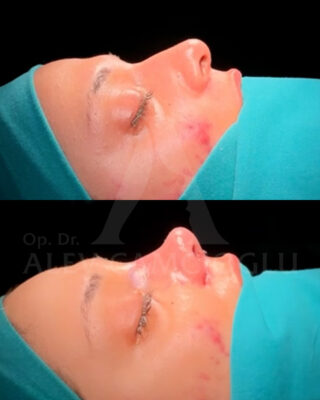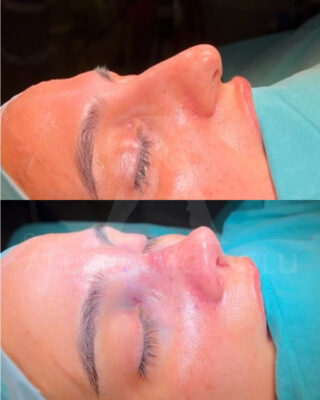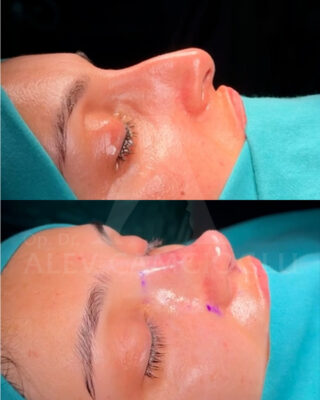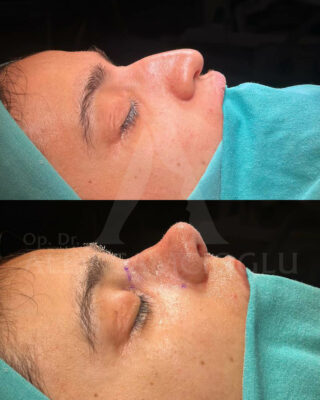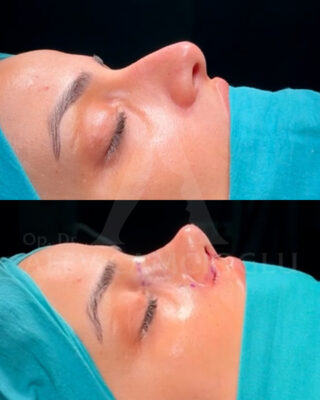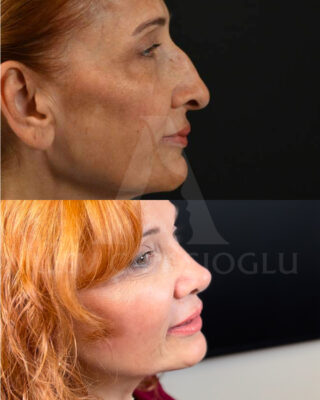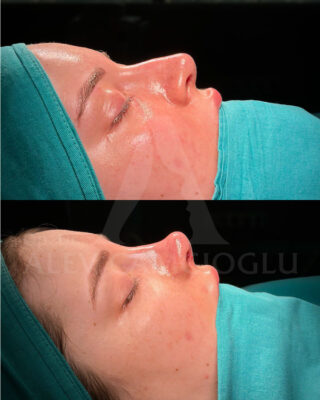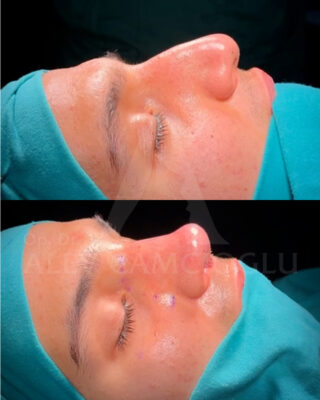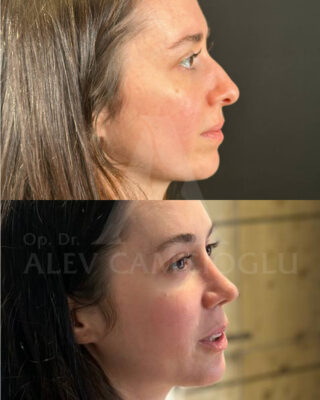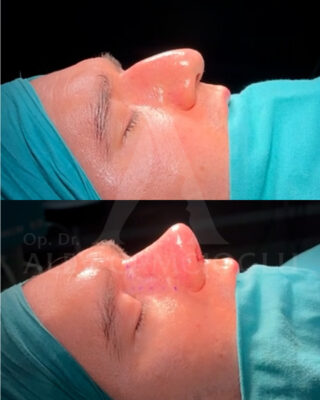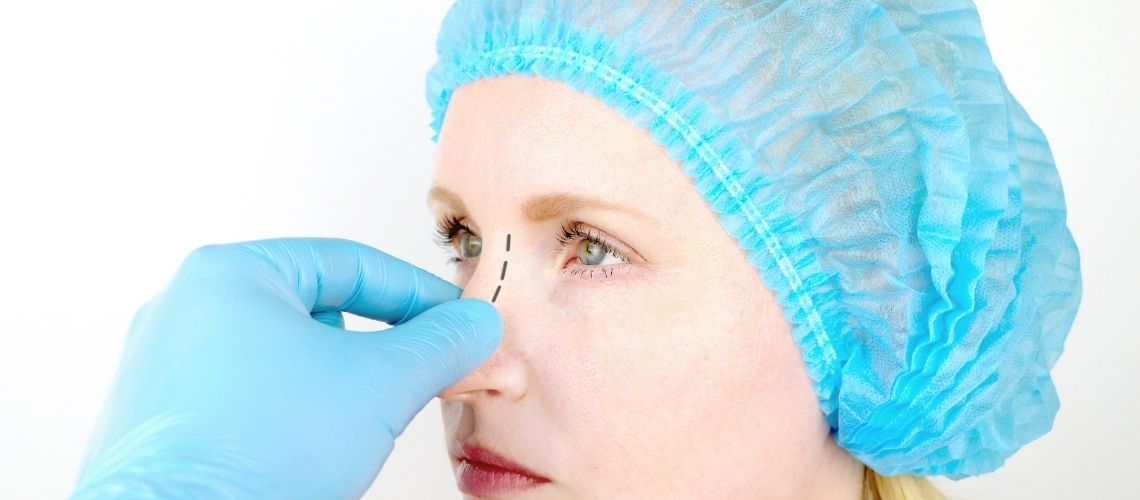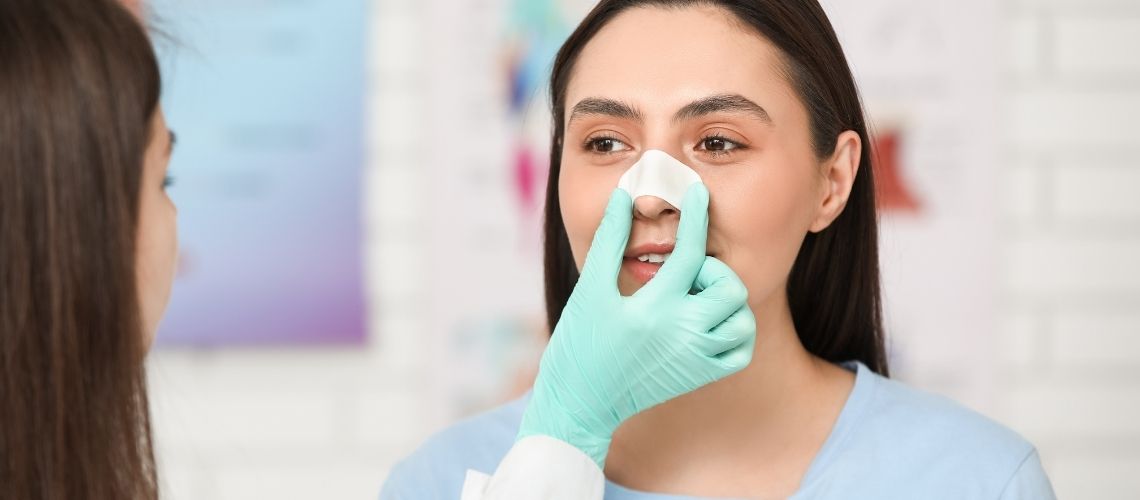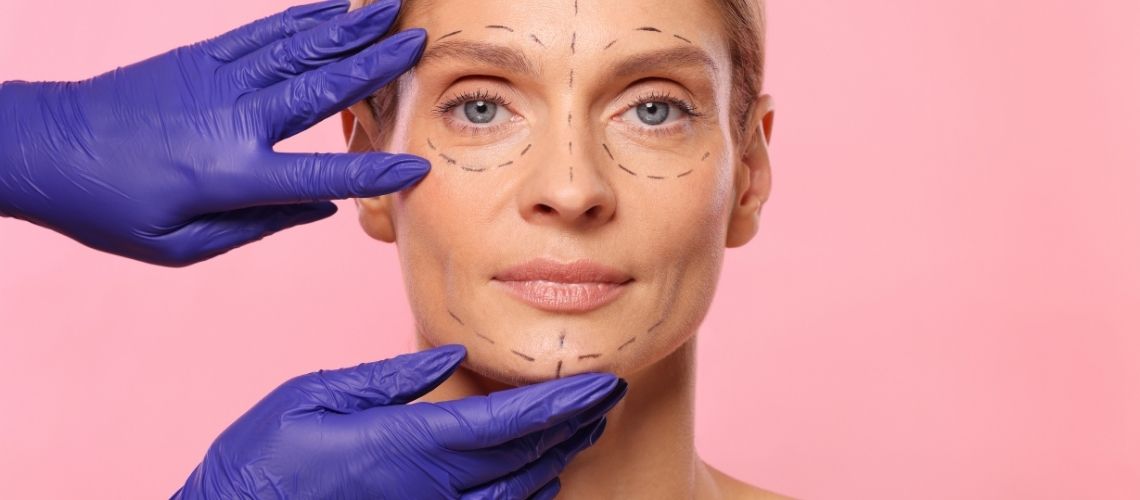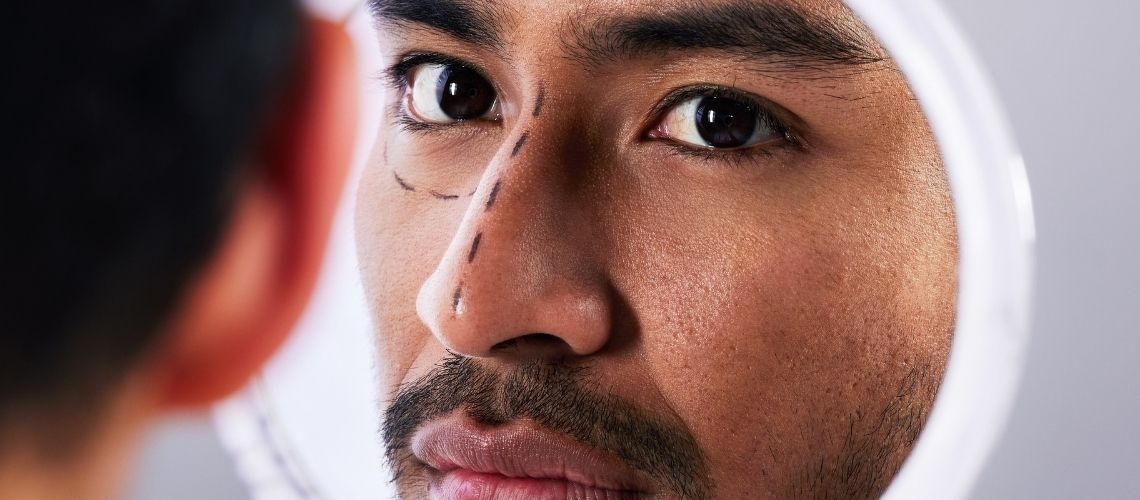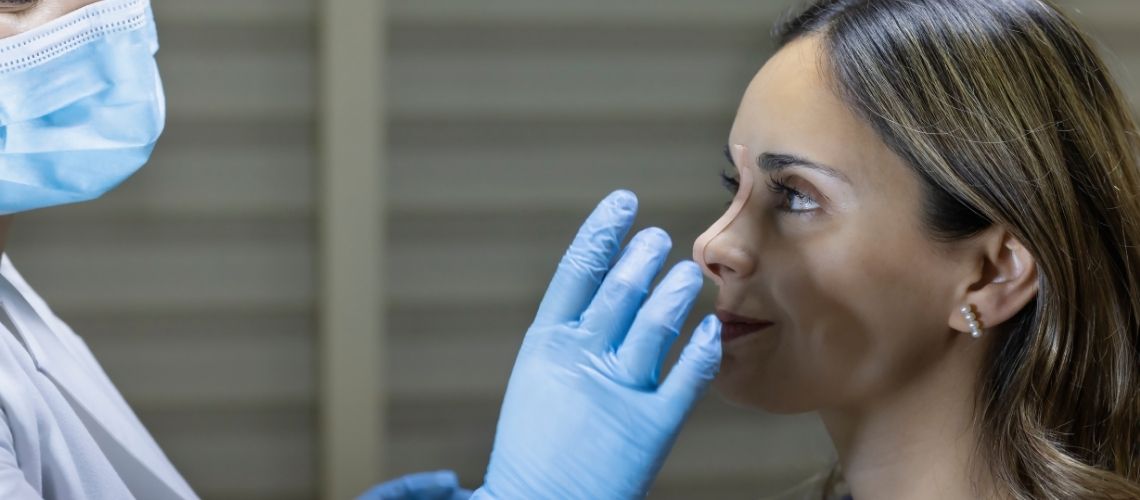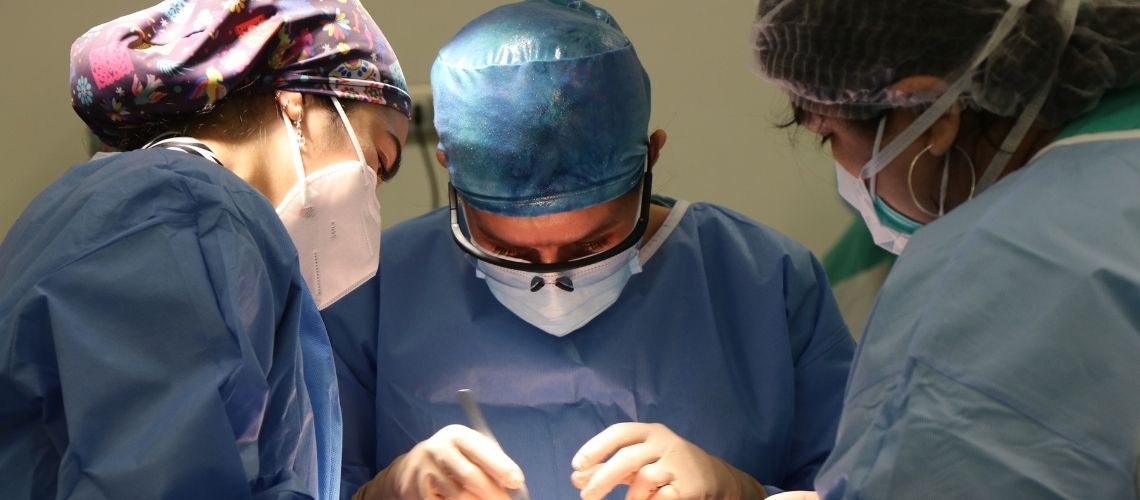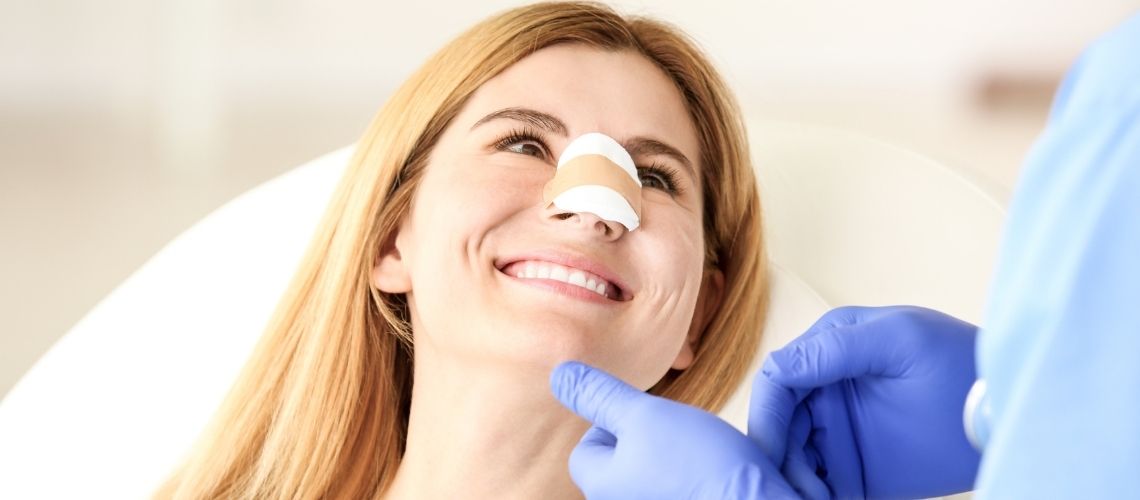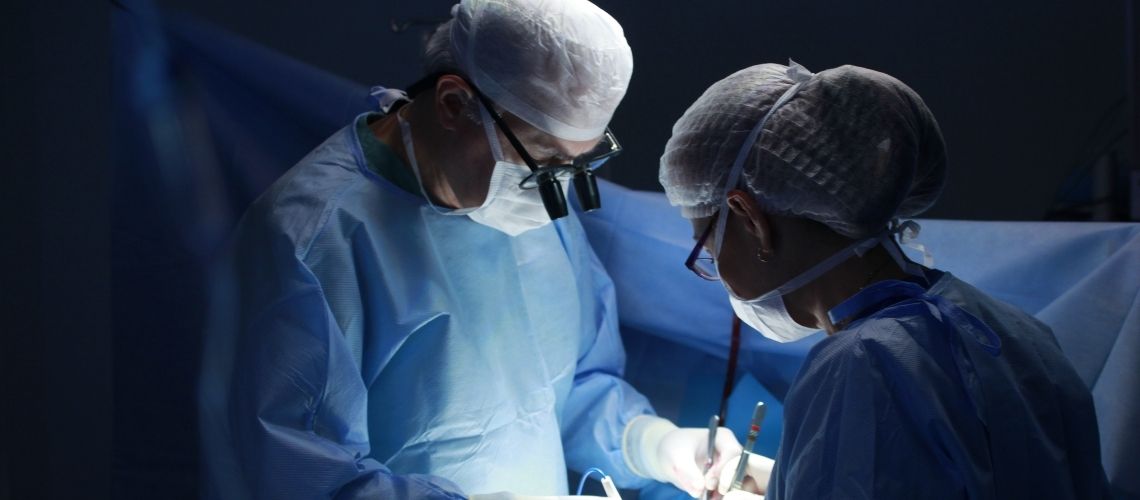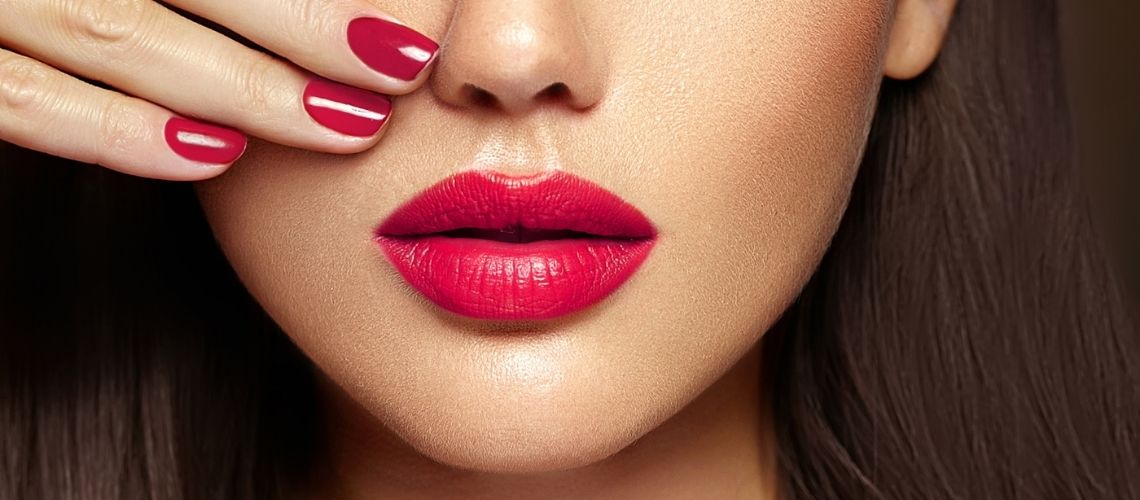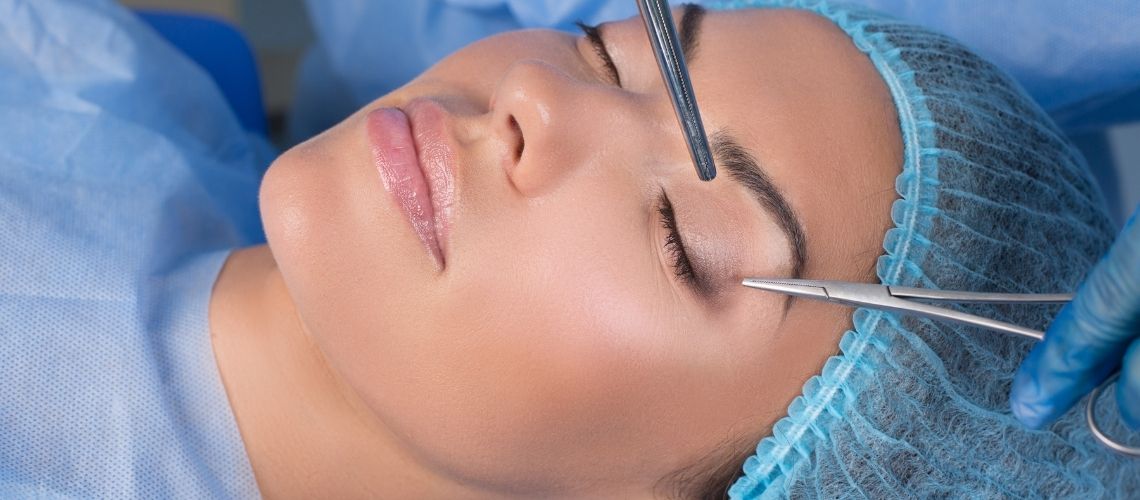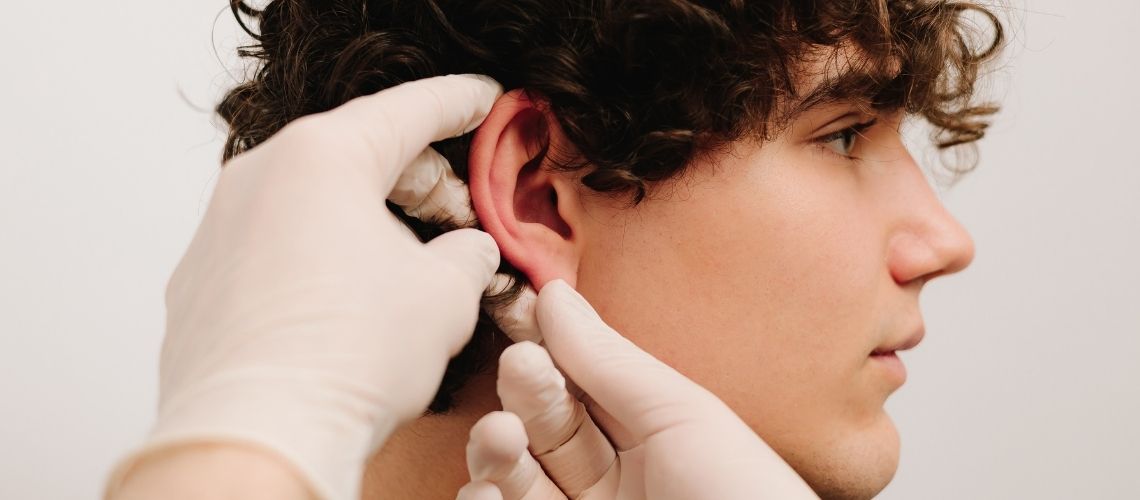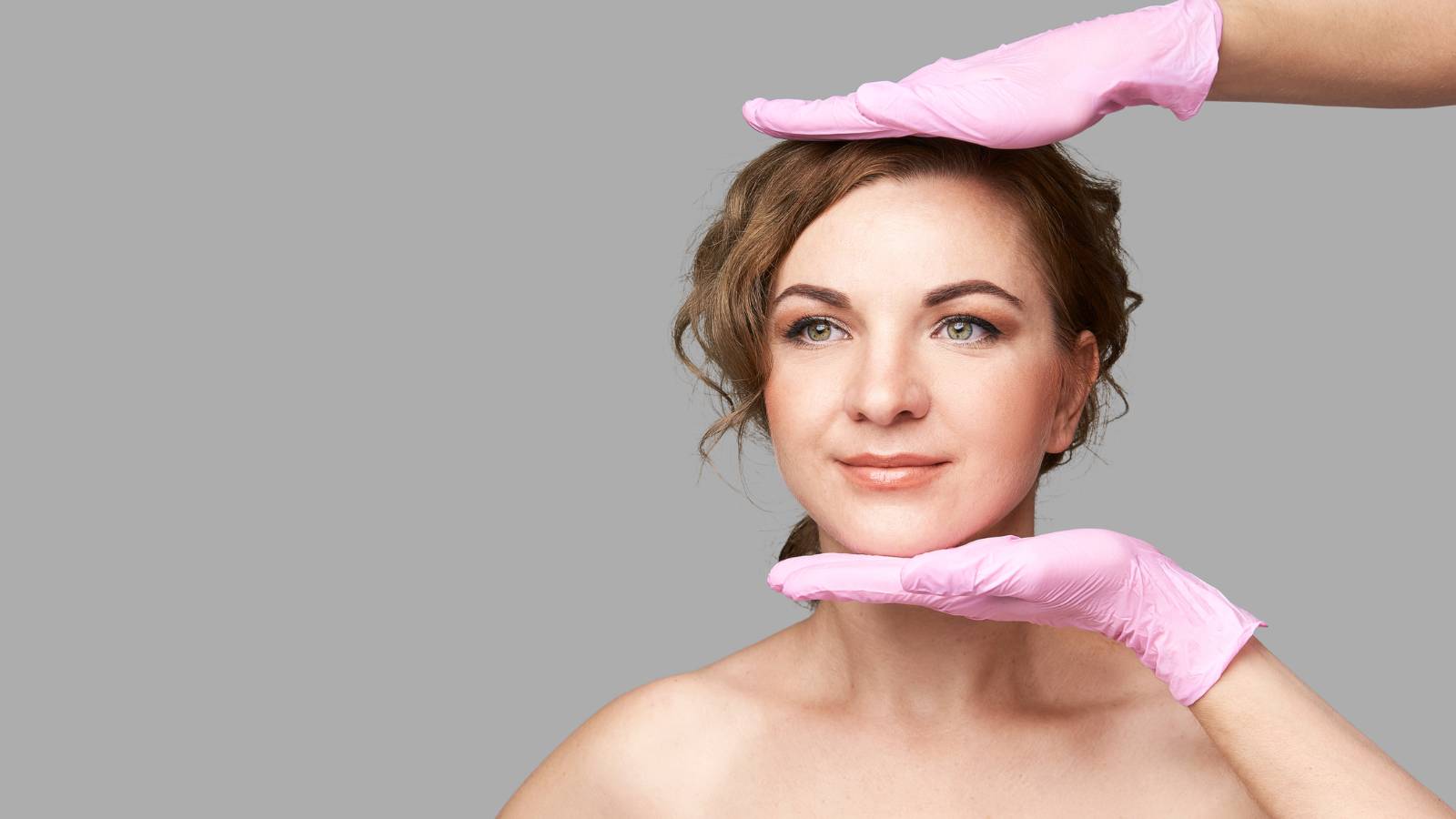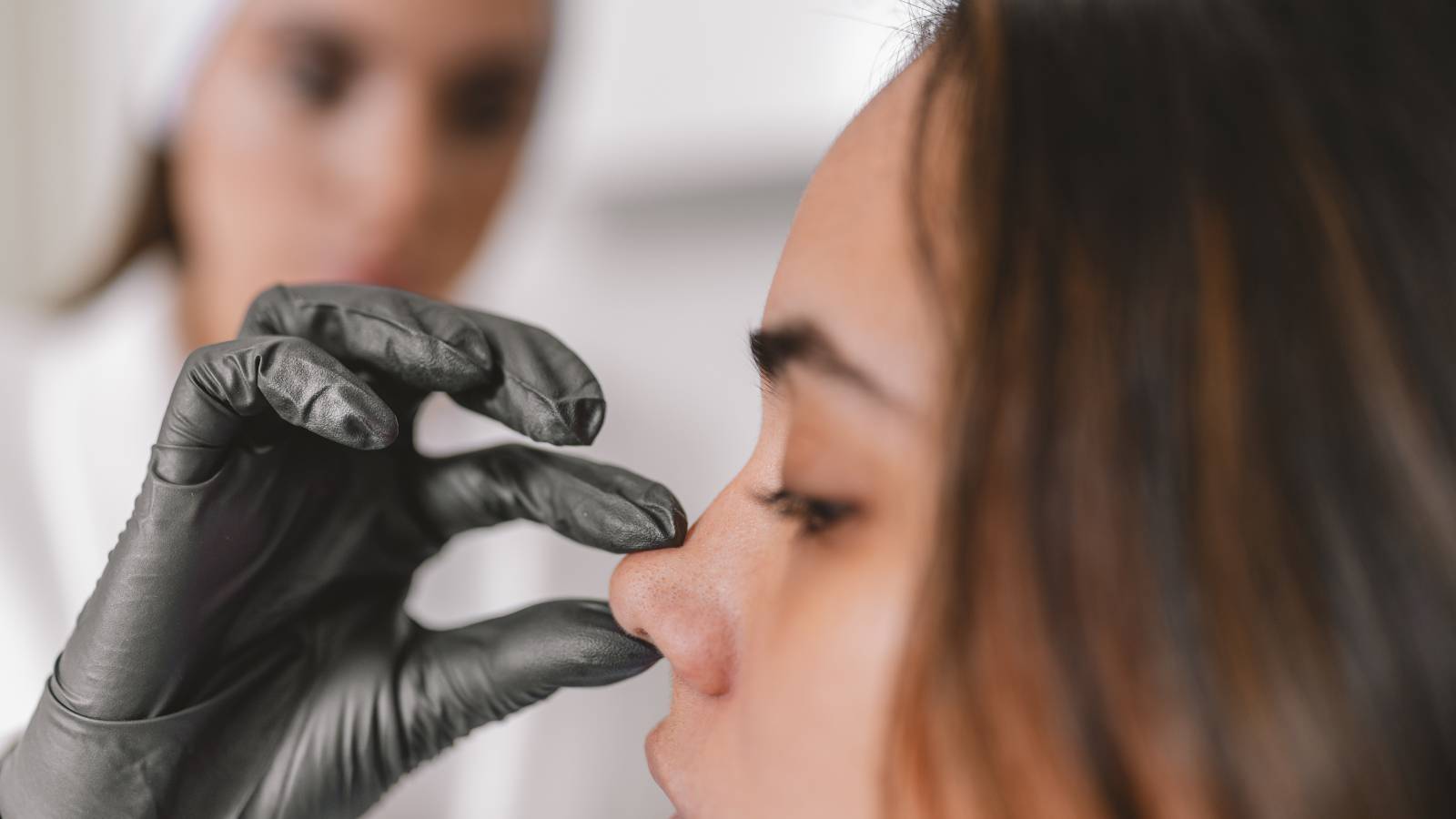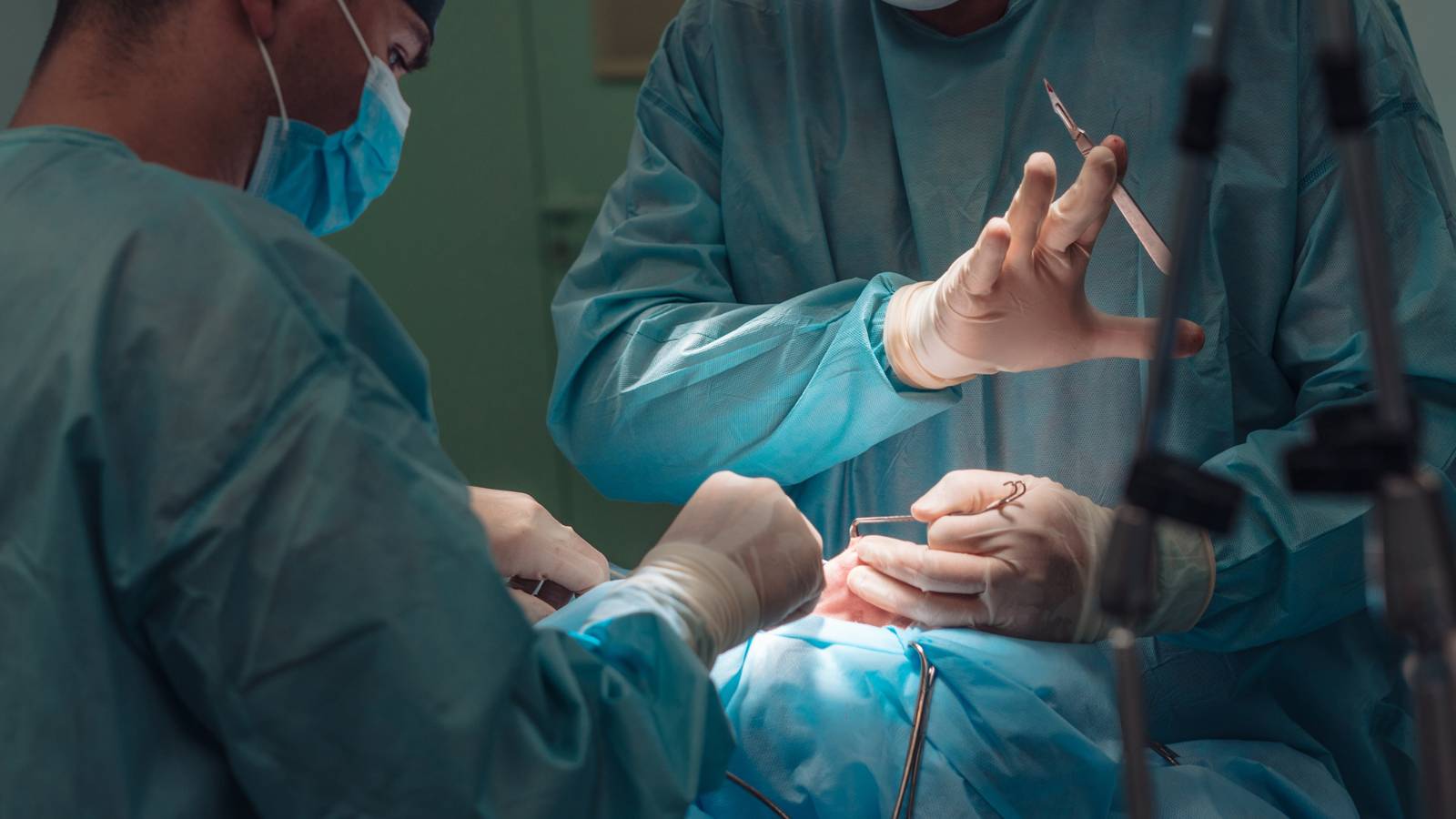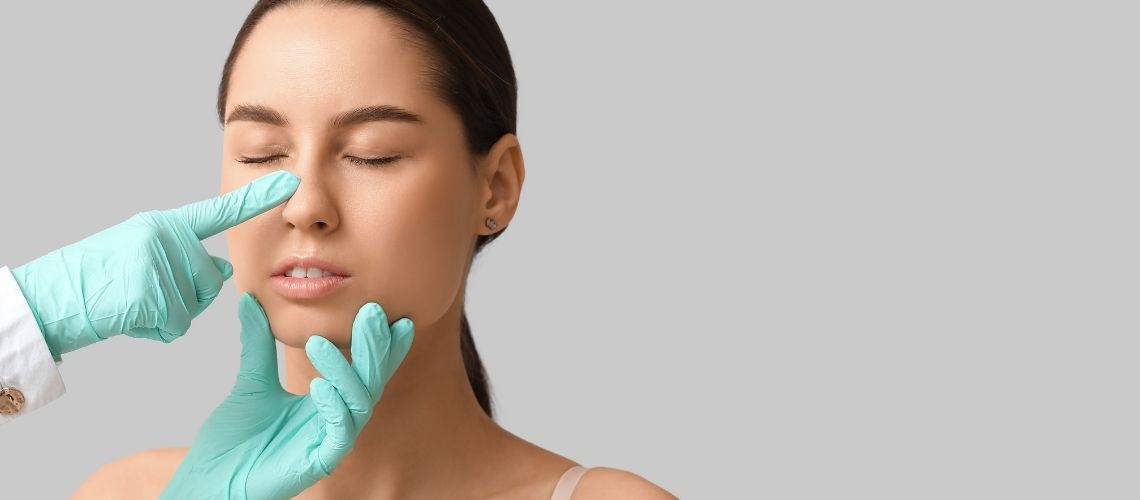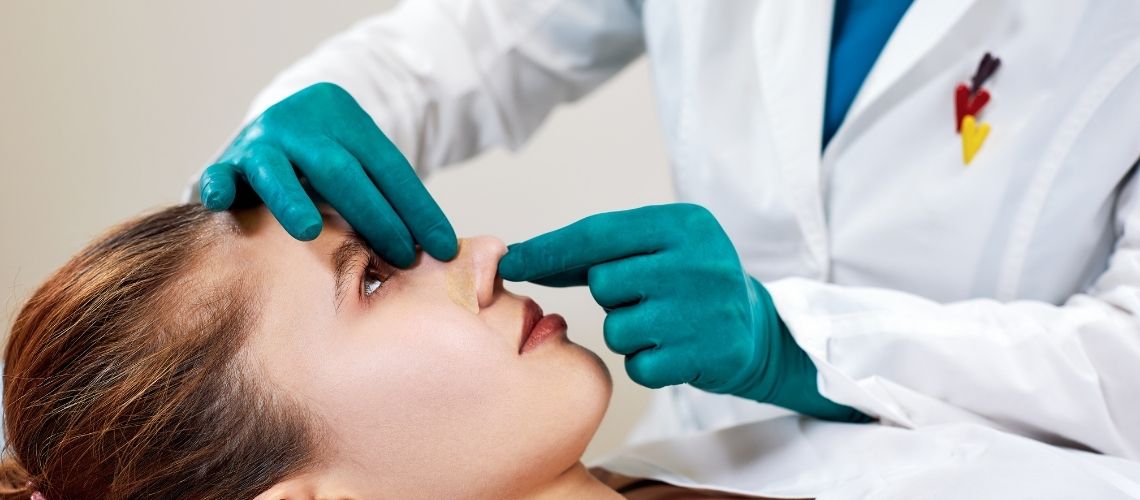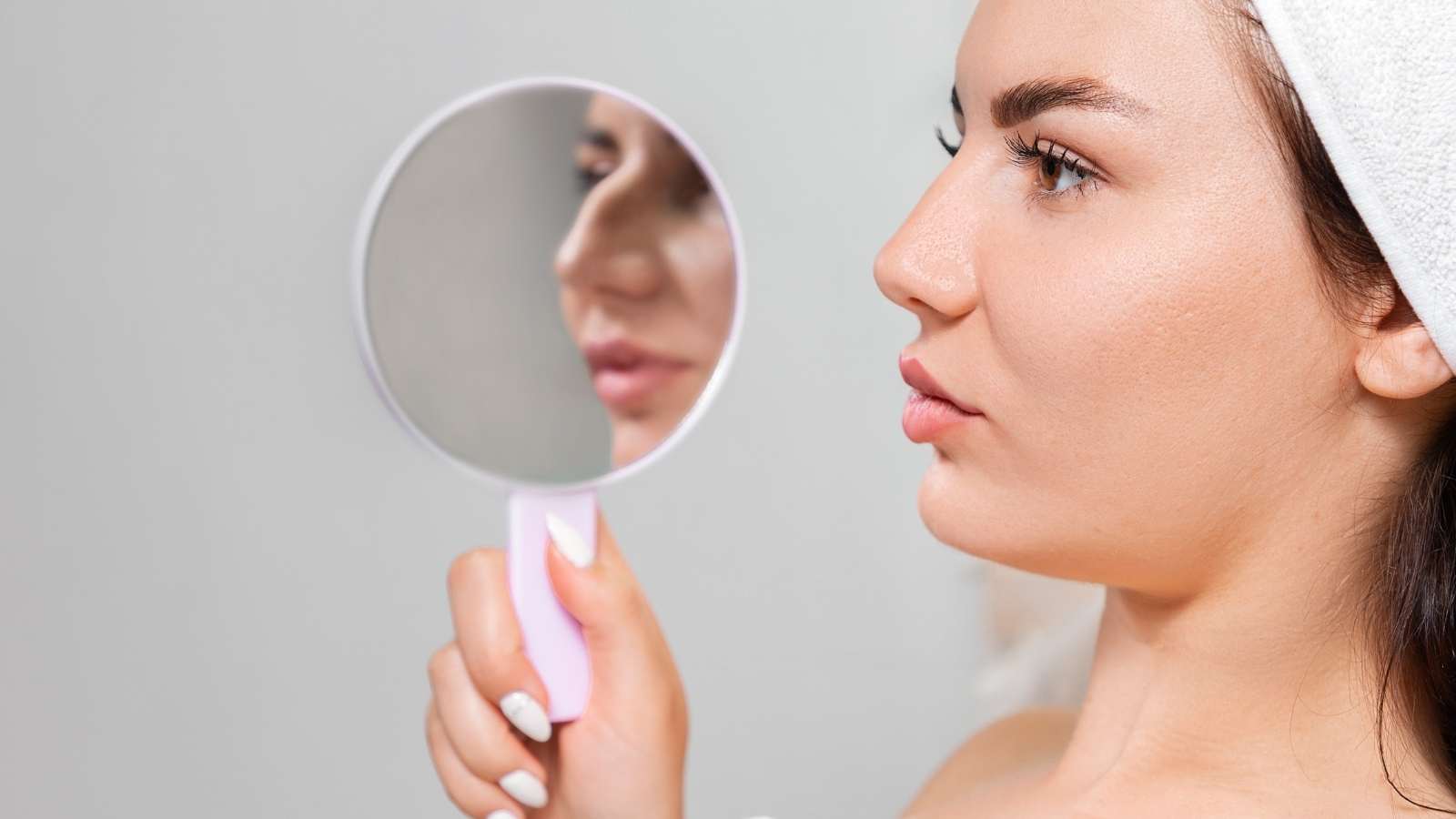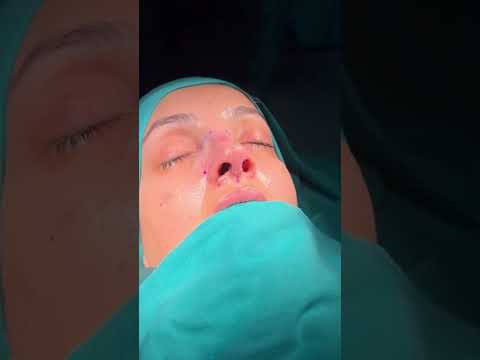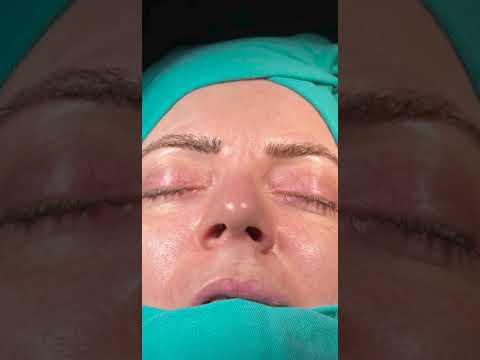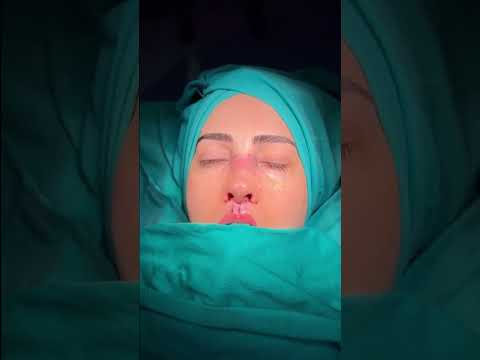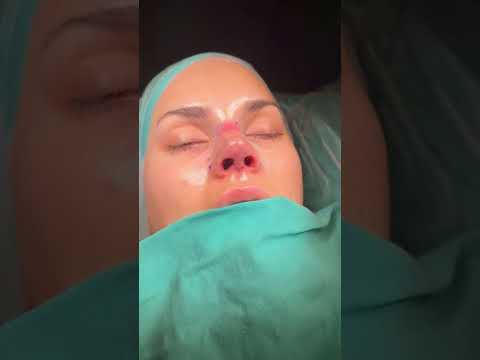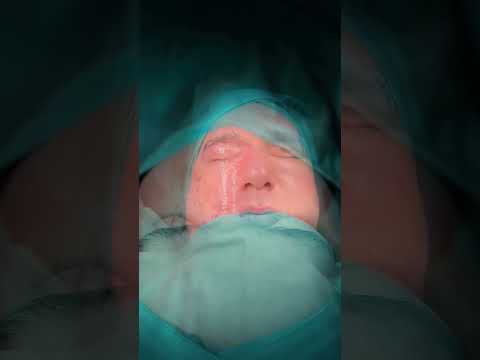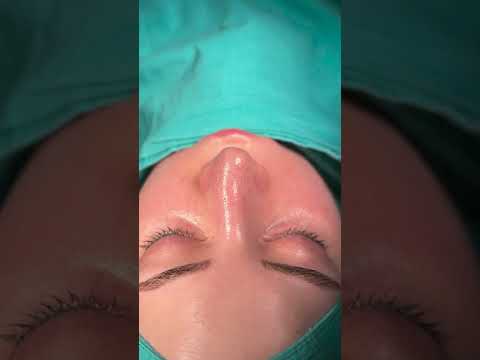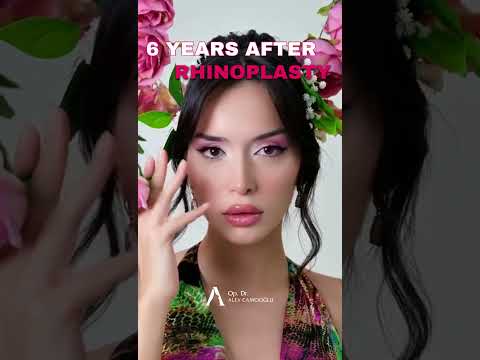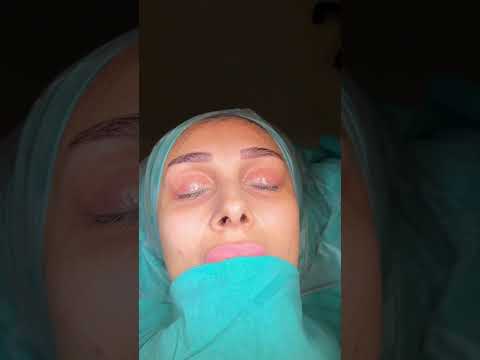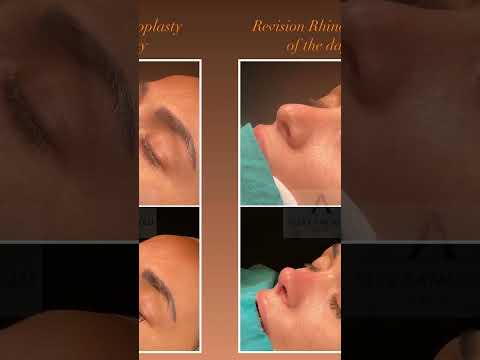Male Rhinoplasty in Turkey
For men seeking nasal enhancements that maintain masculine facial characteristics, Dr. Alev Camcıoğlu offers specialized Male Rhinoplasty in Turkey. We recognize the distinct aesthetic preferences of our male patients and tailor each surgery to achieve a balanced and natural look. Enhance your confidence with a procedure designed specifically for you.
Cost of Male Rhinoplasty in Istanbul, Turkey ranges between €5,000– €7,000 in 2025 depending on hospital, package, and anatomy of your nose. Check our prices, before & after photos, and patient results from the USA, UK, Canada, Australia, and the rest of the world.

What is Rhinoplasty for Men?
Rhinoplasty for men is considered one of the most critical elements of facial aesthetics. This procedure can be performed for both aesthetic and functional purposes. Male patients often desire their noses to gain a more masculine appearance. Therefore, the surgical intervention focuses on making the size and shape of the nose harmonize with the overall facial proportions.
Aesthetic purposes:
- Enhancing nasal symmetry.
- Reshaping the nasal tip.
- Straightening the nasal bridge.
Functional purposes:
- Facilitating easier breathing.
- Eliminating airway obstructions.
- Normalizing the internal structures of the nose.
Careful evaluations and precise intervention techniques are crucial during the surgical procedure. The surgeon aims to create a proportionate nose suitable for the patient’s facial structure. The patient’s current health status and previous surgical interventions are also considered in this process. The improvement and proportioning process greatly depend on the surgeon’s experience and anatomical knowledge.
The techniques used in rhinoplasty are specially selected to meet the aesthetic expectations of male patients. These techniques include grafting, reduction, and reshaping. Each technique is applied to improve the nasal structure and achieve a more natural appearance. Consequently, male patients can attain a more balanced facial symmetry and increased self-confidence.
The benefits of rhinoplasty are not limited to appearance alone. It also provides functional improvements. This is particularly beneficial for men who are active or engage in sports, as it can enhance their daily quality of life. The adaptation and recovery process post-surgery is managed by strictly adhering to the surgeon’s recommendations.
This process can directly affect the recovery speed and the permanence of the results. Over time, surgical results adapt to the facial structure, becoming more stable. Thus, the aesthetic and functional improvements achieved with rhinoplasty continue in the long term. For men, this can create a noticeable change in their social and professional lives. For these reasons, rhinoplasty is a frequently preferred and highly satisfactory aesthetic surgical procedure among men.
What is the Ideal Age for Rhinoplasty in Men?
Many patients seek this surgery as soon as they turn 18. However, since facial bones in men fully settle at the age of 22, this age is more suitable. This ensures optimal aesthetic and functional results from the operation. When deciding on rhinoplasty for men, it is important for facial bones to have fully developed because:
- The complete development of the bone structure makes the surgeon’s job easier.
- Aesthetic results are more balanced and lasting.
- Functional improvements are maintained in the long term.
6 Reasons to Get Male Rhinoplasty in Istanbul



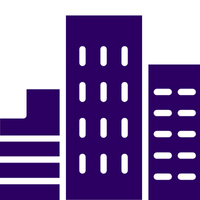
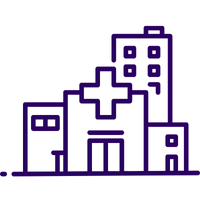

Post-OP
Care
Male Rhinoplasty Before & After Photos in Turkey
Differences Between Rhinoplasty in Men and Women
Rhinoplasty in men usually aims for a natural look. Male patients prefer their noses to look as if they were born with them, without appearing artificial. Therefore, interventions are less pronounced, with a focus on naturalness. After aesthetic nasal surgery, men aim to retain their masculine features. On the other hand, women typically prefer a thinner and more aesthetically pronounced nose. Women’s aesthetic expectations are generally centered around making their facial features appear more feminine.
Men:
- Prefer that it does not appear they have had surgery.
- The nasal bridge can remain slightly prominent.
- Prefer straighter and wider nasal tips.
- Nasal wings are less pronounced and look natural.
- The nasolabial angle is usually desired to be around 90 degrees.
Women:
- Prefer a narrower and smaller nose structure.
- Prefer a slightly curved and arched nasal bridge.
- The nasal tips can be sharper and more pronounced.
- Nasal wings are designed to be more open to the sides.
- The nasolabial angle is kept between 95-105 degrees.
The aesthetic approach for both genders is planned to be in harmony with the other parts of the face. For men, aesthetics aim for a less noticeable and natural result, while women generally desire a more pronounced and aesthetically perfect appearance. Men’s noses are arranged to be larger and less curved, while women’s noses are made thinner and more curved. Consequently, gender-specific aesthetic understanding is shaped by considering the person’s facial features and their place in society. These aesthetic differences between men and women are addressed in a way that supports the overall beauty of the face.
How is Rhinoplasty Performed in Men?
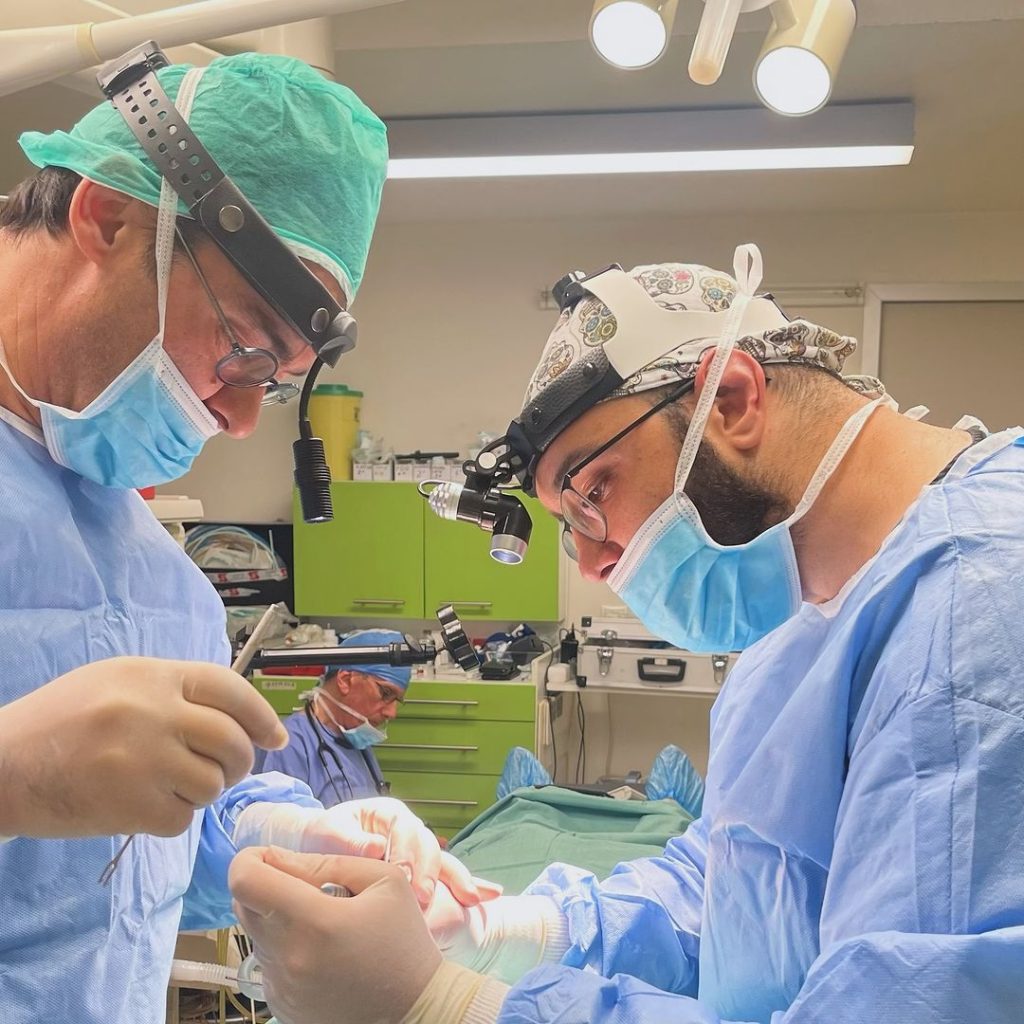
Rhinoplasty in men is performed to enhance facial features in a balanced manner. The width of the nasal bridge is particularly important in men and nasal structures are shaped accordingly. Two main techniques are adopted in this process:
- The skin in the middle part of the nose is lifted to expose all structural elements.
- This technique provides wide access for detailed corrections.
Closed rhinoplasty:
- Incisions are made inside the nostrils.
- Adjustments are made without leaving visible scars.
Various methods are used to shape the nasal bridge in both techniques. While chisels and hammers were traditionally used, more sophisticated tools are preferred today. Special crystal saws provide smoother and finer adjustments. These techniques aim to improve aesthetics as well as enhance nasal functions. Male patients generally desire a more prominent and straight nasal bridge.
How Does Closed Rhinoplasty Affect Anatomical Structure and Physiological Features?
In closed rhinoplasty, comprehensive knowledge of nasal anatomy is essential. The nasal structure consists of an interconnected complex system, and surgical interventions have significant effects on this system.
Basic Components of Nasal Structure
The nose is an important organ both aesthetically and functionally. The external structure, internal structure, and nasal functions should be carefully considered.
External Nasal Structure
- Bones: The upper part of the nose consists of paired nasal bones. These bones meet at the midline of the face, forming the main skeleton of the nasal bridge.
- Cartilages: Most of the nasal structure is made up of cartilages. The upper lateral cartilages determine the contour of the nasal bridge and contribute to critical functions like the internal nasal valve. The lower lateral cartilages define the shape and size of the nasal tip.
Internal Nasal Structure
- Septum: This structure divides the nasal cavity into two separate zones and plays a key role in regulating airflow. This wall, made of cartilage and bone covered with mucosa, provides stability within the nose.
- Turbinates: These mucosa-covered bony structures are effective in humidifying and warming the air. They also regulate airflow, enhancing the quality of inhaled air.
Muscles and Tissues
Nasal muscles play an important role in facial expressions and support nasal functions.
Mimic Muscles:
- Nazalis: Narrows the nasal wings, reducing the surface area of the nose and increasing airflow.
- Levator labii aleque nasi: Widens the nostrils, facilitating deep breathing.
- Depressor septi: Pulls the nasal tip downward, increasing the openness of the nostrils.
Soft Tissues and Skin:
- SSTE (Skin and Soft Tissue Envelope): The thickness of the nasal skin is a factor that should be considered during surgery. Changes are more noticeable in patients with thin skin, while they are less noticeable in those with thick skin.
Vascular and Neural Structures
The nose has a rich network of blood vessels, which is an important factor during surgical interventions.
Arteries:
- Supratrochlear and facial arteries: These large vessels supply oxygen and nutrients to the nasal tissues.
- Columellar arteries: These vessels provide the vascular connection of the nasal tip.
Venous Drainage:
- Venous blood returns via the facial vein. This process regulates blood pressure in the nasal area and prevents edema formation.
Preservation of Nasal Functions
Surgical interventions can affect nasal functions; therefore, care is needed at every step.
Airway Patency:
- During closed rhinoplasty, it is crucial to maintain airway patency, especially in the internal nasal valve area. This area is the narrowest point of airflow within the nose and can cause nasal congestion.
Aesthetic and Functional Balance:
- Aesthetic improvements should be planned to preserve functional capacity. Each step of rhinoplasty should improve both appearance and function.
Open Rhinoplasty: Anatomical and Physiological Factors
The open rhinoplasty process requires a detailed evaluation and correction of the nasal structure. In this process, the surgeon must consider many anatomical and physiological factors. Here are some of these factors:
Nasal Structure and Sections
The nose contains various anatomical structures, each with special significance in rhinoplasty. These structures can be listed as follows:
- Ala: The structure forming the lower lateral wings of the nostrils.
- Alar Groove: The depression located between the ala and lower lateral crus.
- Anterior Septal Angle: The angle formed by the dorsal and caudal septum.
- Columella: The skin section between the nostrils connecting the nasal tip to the base.
- Dome: The nasal tip projection formed by the junction of the middle and lateral crura.
- Dorsum: The outer midline ridge of the nose extending from the nasal tip to the nasion.
Airway Structures and Nasal Function
The nose houses critical structures for respiratory function. These structures and their characteristics are as follows:
- External Nasal Valve: The structure forming the nostril opening.
- Internal Nasal Valve: The area with the highest airway resistance, limited by the upper lateral cartilage, inferior turbinate head, and nasal septum.
Other Important Anatomical Points Considered in Rhinoplasty
Various measurements are made during rhinoplasty for aesthetic and functional improvement of the nasal structure:
- Nasion: The depression marked by the nasofrontal suture.
- Nasolabial Angle: The angle between the long axis of the nostril and the line perpendicular to the Frankfurt horizontal plane.
- Radix: The junction area of the nose and frontal bone.
- Rhinion: The surface location of the bony-cartilaginous junction along the nasal bridge.
- Supratip Area: The area above where the caudal nasal bridge meets the nasal tip.
Nasal Analysis and Evaluation
A comprehensive nasal analysis before rhinoplasty is essential for the success of the surgical intervention. The main points considered in this analysis include:
- The nose is divided into three main sections: upper, middle, and lower thirds.
- Each section is evaluated for symmetry, width, contour irregularities, tip shape, and position.
- The surgeon should document the thickness of the nasal skin. Thick skin can affect the surgery and recovery process.
- Nasal palpation assesses tip support, caudal septum integrity, and the size and position of the nasal bones.
Determination of Surgical Techniques
In the final evaluation stage, the nasal cavity must be examined. This examination determines which surgical techniques will be applied:
- Septoplasty: Necessary for correcting a deviated septum.
- Turbinate Reduction: Reducing enlarged turbinates improves breathing.
- Spreader Grafts: Support the function of the internal nasal valve and correct aesthetic imbalances.
What Precautions Should Be Taken During the Preparation Process for Rhinoplasty in Men?
There are some important points to consider when preparing for a rhinoplasty operation. First, it is crucial to clearly determine the patient’s expectations and document them. In this process;
- The patient’s desires are recorded in detail.
- Photos of the face are taken from different angles.
- If a desired nose shape exists, it is supported with sample images.
The patient should clearly express what they expect and give their consent. Additionally, preoperative health checks are mandatory for the safety of the operation. These checks include:
- Blood value analysis,
- Control of medications used, especially blood thinners,
- Evaluation of general health status.
If the patient is using blood thinners, these medications should be discontinued a few days before the surgery. Whether the patient has a health condition that prevents surgery is also determined through these checks. All these steps are of great importance for both patient safety and increasing postoperative satisfaction. Finally, when the preoperative preparations are completed, the patient takes a step not only towards an aesthetic change but also towards improving their quality of life.
What Should Be Considered During the Recovery Process After Rhinoplasty in Men?
After rhinoplasty surgery, there are some important steps that male patients need to follow. This process ensures rapid and effective recovery from the effects of the surgery. Here are the rules that male patients should follow during the postoperative period:
- The first night should be spent in the hospital. During this time, necessary monitoring is provided to control swelling and bleeding on the face.
- During the recovery period after surgery, it is essential to regularly use the medications recommended by the doctor, especially painkillers.
- Regular ice application should be performed during the first night. This helps reduce swelling and alleviate bruising.
Precautions to be taken during the first two weeks of recovery:
- The nose is supported with a cast or special bandages. This accelerates the recovery process and minimizes potential damage to the nose.
- It is recommended that the patient support their head with a high pillow and move as little as possible.
Considerations during the first three months of recovery:
- Physical activities should be avoided, especially sports or movements that may exert pressure on the face.
- High-temperature environments such as saunas and steam baths should be avoided.
- Exposure to sunlight should be avoided and sunscreen should be used.
Rhinoplasty for Men: When to Choose Open or Closed Rhinoplasty?
Rhinoplasty is a frequently performed procedure in men to meet aesthetic and functional needs. There are two main approaches in terms of surgical techniques: open and closed rhinoplasty. Both techniques offer unique advantages, and the surgeon’s choice is shaped by the patient’s specific situation and surgical goals.
Open rhinoplasty is preferred especially for complex cases. This method provides a more detailed examination of the nasal structure. Procedures requiring finer adjustments, such as reshaping the nasal tip, septum, and nasal valves, are easier with open rhinoplasty. Additionally, open rhinoplasty allows clear visualization of the internal structures of the nose and is often used for teaching and training purposes among surgeons.
Closed rhinoplasty is generally suitable for less complex cases. This method is performed through incisions inside the nostrils and leaves no visible scars. The recovery process for patients is usually shorter, and side effects such as swelling and bruising are less common. This method is effective for both aesthetic corrections and mild functional problems.
Determining suitable candidates for both techniques requires a detailed preoperative assessment process. In this process, the following are considered:
- The patient’s aesthetic expectations,
- Needs for functional improvements,
- Facial structure and nasal anatomy.
In conclusion, when choosing between open or closed rhinoplasty, the following should be considered:
- The patient’s specific needs,
- The complexity of the surgery,
- The expected aesthetic and functional results.
The choice between these two methods is closely related not only to the surgeon’s skills and experience but also to the patient’s specific situation and expectations. Therefore, the advantages and limitations of both methods should be openly discussed with the patient, and the most appropriate option should be decided together.
How Much Does a Male Rhinoplasty in Turkey in 2025 ?
The cost of a Male Rhinoplasty in Istanbul, Turkey, typically ranges between €5,000 and €7,000. The price can vary depending on several factors, such as the surgeon's experience, the complexity of the procedure, the clinic's reputation, and additional services included in the package.
| Average Male Rhinoplasty Cost (in Euros) in 2025 | |
| United Kingdom | €16,600 – €19,000 |
| United States | €14,200 – €23,400 |
| Canada | €16,000 – €19,000 |
| Australia | €23,800 – €37,800 |
| South Korea | €9,400 – €17,200 |
| Ireland | €13,000 – €15,000 |
| Germany | €11,000 – €13,000 |
| Netherlands | €11,000 – €13,000 |
| France | €11,000 – €13,000 |
| Turkey | €5,000– €7,000 |
Frequently Asked Questions
Yes, rhinoplasty can create significant changes in men’s facial features. Since the nose is located in the center of the face, any changes made to it affect the overall facial expression. Therefore, such an operation can make facial features more balanced and aesthetically pleasing. Additionally, a successful rhinoplasty operation can boost a person’s self-confidence, which can also positively improve their overall facial expression.
The earliest age typically determined for rhinoplasty in men is generally 20 years. This age is important for the complete development of bones and cartilage. However, in the case of special health issues or serious aesthetic concerns, aesthetic intervention can be performed earlier upon the doctor’s recommendation. Therefore, as a general rule, 20 years is considered the appropriate starting age for rhinoplasty.
Rhinoplasty in men usually aims for a more masculine appearance, while women prefer more feminine and elegant nose shapes. Men’s noses are typically larger with a wider nasal tip and thicker skin; the nasal bridge is straighter. In women, the nasal tip is more elevated, and the nasal bridge is more curved. Additionally, the angle between the nose and lips in men is generally around 90 degrees, while in women, this angle is wider. These anatomical and aesthetic differences are taken into account when planning aesthetic operations.
The prices of rhinoplasty for men are based on several important factors. The complexity of the operation can increase the price; for example, a more difficult procedure results in a higher cost. Additionally, the surgeon’s experience and reputation play a role in pricing. The quality of the operation varies according to the standards of the hospital or clinic. The materials used and the type of anesthesia also affect the cost. Furthermore, the location of the operation is another factor; prices are generally higher in major cities. Therefore, the patient’s individual needs and preferences influence the final price.
Hump nose correction surgery is a commonly chosen procedure among men. Men who are particularly dissatisfied with the shape of their nose often opt for rhinoplasty. Men aim to achieve a more symmetrical and aesthetic appearance through nose surgery. Rhinoplasty is also one of the most commonly performed cosmetic procedures in men.
Men may opt for rhinoplasty because correcting the shape and size of the nose can boost confidence and bring positive changes to social life. It also addresses breathing problems, preventing issues like snoring and sleep apnea. This surgery meets both the physical and functional needs of men, improving their quality of life. As a result, men can alleviate their aesthetic concerns and lead a healthier life with rhinoplasty.
A man’s nose generally fully develops by the age of 22. This process is completed as the facial bones and cartilage structures fully mature. Particularly after adolescence, changes in the bone and cartilage structures slow down. Therefore, 22 years of age is an ideal time for aesthetic operations. At this age, the overall structure of the face becomes more stable. Additionally, the results of procedures like rhinoplasty are more permanent. Thus, the full development of the nasal structure in men occurs around the age of 22.
One of the Best Clinic Team for Male Rhinoplasty in Turkey
Dr. Alev Camcıoğlu is considered to be one of the best Male Rhinoplasty surgeon in Turkey. You can check Male Rhinoplasty reviews here.
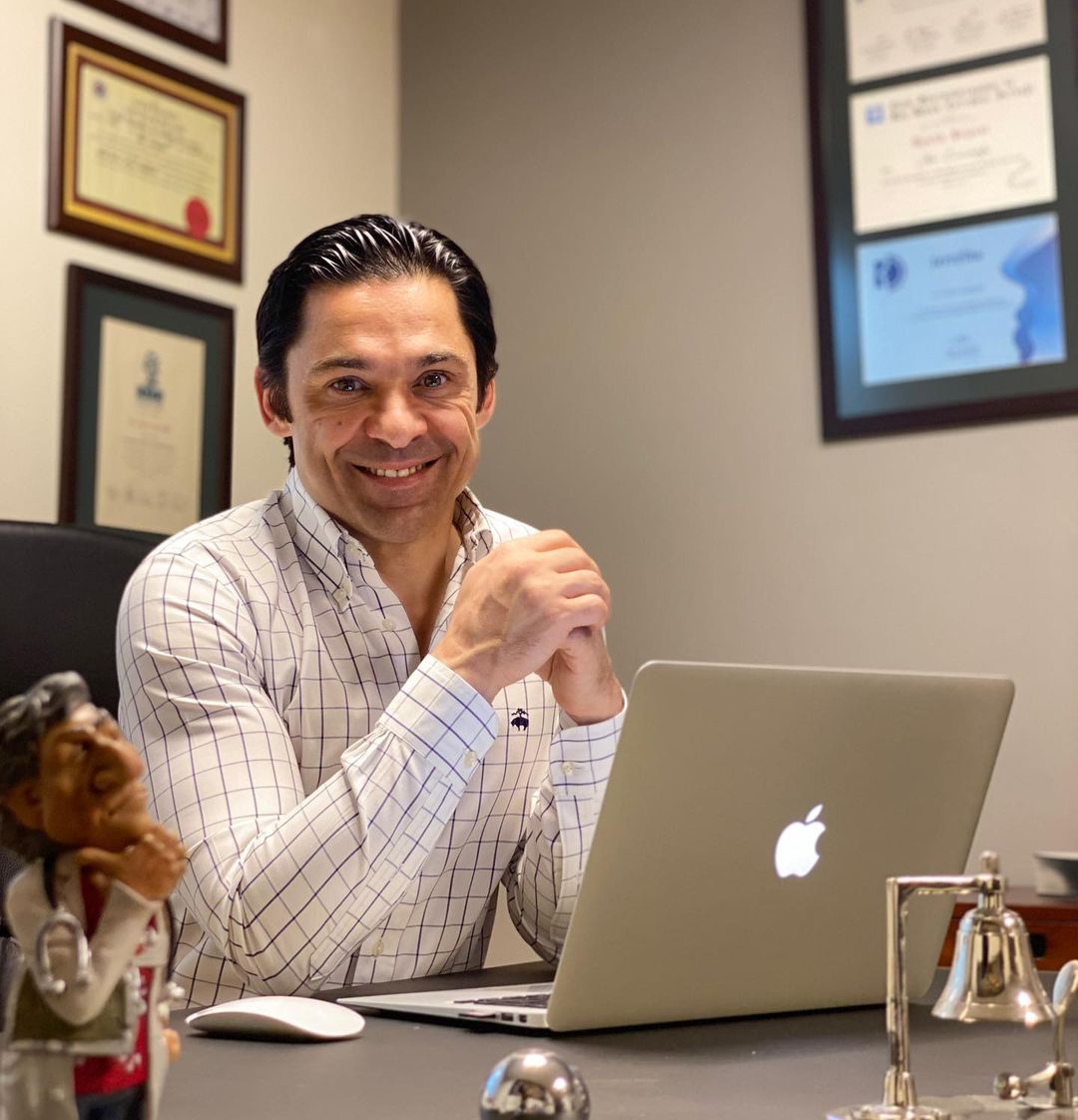
Op. Dr. Alev Camcıoğlu
Rhinoplasty Surgeon

Aylin Uyuşmak
Clinical Coordinator

Serra Sevgili
Clinical Assistant

Sema Yapıcı
Operating Room Nurse





